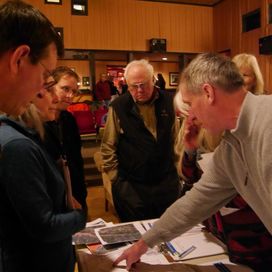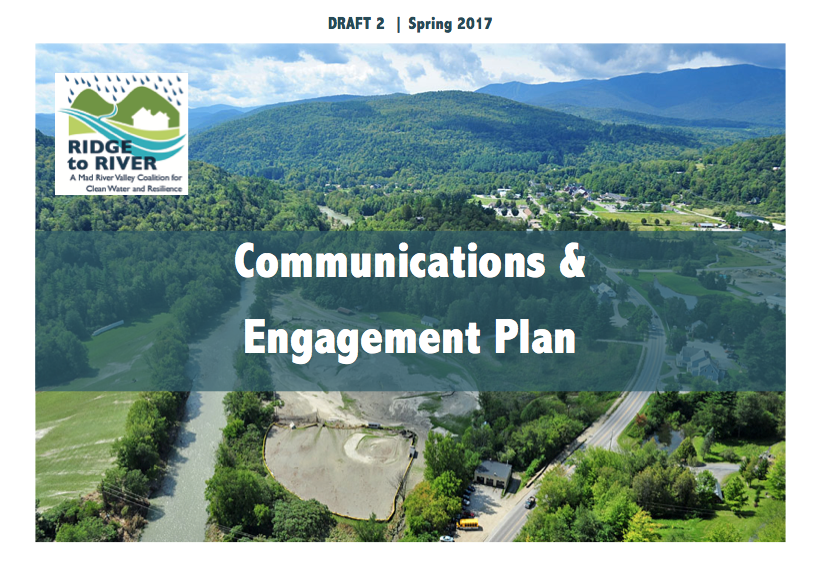|
Based on our goals of reducing stormwater runoff throughout the Mad River Valley - and the environmental research highlighting the distributed nature of stormwater problems - we knew that our action framework would have to involve a diverse range of stakeholders across the Valley. In order to successfully engage numerous groups, we'd need to better understand each one and design targeted strategies.
ENGAGEMENT EVENTSRidge to River started planning events from the outset, to begin engaging with community members. Every event allows us to better understand our community, start increasing awareness of stormwater issues, and identify next steps. We've offered diverse events in different locations, as a way to appeal to different segments of the community.
|
|
MRV Town Leadership Meetings (2015 & 2016): Joint meetings of Selectboard members and other town leaders from all five watershed towns. These critical events help build a culture of peer-to-peer sharing and collaboration across town boundaries.
|
Municipal Board Meetings: Ridge to River Taskforce members serve on town boards and commissions, and our staff support members also attend many meetings. Going directly to these boards with information and questions is one of the best ways to engage them.
|
Sugarbush Lunch & Learn (July 2016): Community members came together at this informal lunch event to learn about the Ridge to River initiative and resilience issues in the Mad River Valley. It attracted a strong crowd of professionals and leaders to discuss challenges across sectors.
|
|
Community Resilience Forum & Celebration (December 2016): More than 100 Valley community members came together in December, 2016 to celebrate the Mad River Valley’s progress since Irene and learn about critical actions for building a stronger future. Participants met at the Big Picture Theater in Waitsfield for food and drinks, sharing stories of success, and a “marketplace” with information and resources to help homeowners and businesses protect their property, safety, and the health of our watershed. The Forum was brought to you by the Ridge to River Initiative, Friends of the Mad River, and the Mad River Valley Planning District.
|
|
|
Community Forum at Lareau Farm (2017):In October 2017, Ridge to River hosted a successful Community Forum at Lareau Farm Inn to celebrate resilience, investigate what a changing climate means for the Valley, and discuss how can we become stronger, smarter and safer. Roger Hill (Weathering Heights) delivered the keynote "Weathering Climate & Extreme Weather." Over 140 people joined us for an evening of learning, sharing, and community.
|
|
ENGAGEMENT PLANNING & RESEARCH
Stakeholder Planning
|
Community Workshop led a process to help the Taskforce (and Communications & Engagement team) identify and understand community stakeholder groups. The steps included identifying core stakeholders, mapping out target actions, values and beliefs, barriers and incentives to action, and developing key messages.
|
Baseline Survey & InterviewsCommunity Workshop helped design a baseline survey to more deeply explore how much people know about resilience and runoff, current actions, and ways to increase action. In addition, we conducted interviews with town leaders, road crews, and other stakeholders to better understand what matters to them and what they need.
|
Best Practices & Model Projects
After identifying our core stakeholders, target actions, and barriers or incentives for action, we looked at best practices and model programs that have worked in similar situations. We looked at examples in the fields of stormwater, but also in household energy efficiency work - a similar challenge in working to encourage small changes in many households.
KEY FINDINGS
Survey FindingsValley Residents Care about Water100% of survey respondents care about clean water, and 97% say managing stormwater protects their quality of life.
Many Residents are Aware & Taking ActionOnly one respondent had never heard the terms "pollution," "runoff," and "sediment." And 85% report actively trying to minimize erosion and runoff on their properties.
Stormwater Action is Limited by Resources & SkillsThe top three barriers to taking action on stormwater:
|
|
DIG DEEPER
Baseline Survey ResultsOur full survey results are analyzed below, showing current beliefs and actions as well as barriers and incentives. Explore the full survey results here.
|
Engagement & Communications PlanOur engagement plan combines our research and planning on stakeholders with the programs designed to reach them. Browse the plan here.
|





